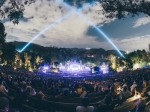Bon Iver and Patti Smith, stopping by the Bowl on a rainy evening
Steven Mirkin on
0

The rain threatened to soak the entire Bon Iver-topped triple-bill at the Hollywood Bowl on Sunday night: A light drizzle during Hiss Golden Messenger’s broken-in, amiably scruffy opening set (with their country gospel crossed with ’70s rock leanings, they come across as an evened out Ryan Adams), heavier drops as Patti Smith turned “Ghost Dance” into prayer for rain, intensifying over the intermission and dissipating as the lights went down Justin Vernon and his band. Clouds hung heavy in the sky during their 90-minute performance.
There’s a certain poetic justice in that, as so much of Bon Iver’s music exists in a kind of emotional overcast. The unsparing, snowed-in solitude of “For Emma, Forever Ago” — arguably the most vulnerable album released in the last decade — was followed by the forlorn, penciled-in sketches of “Bon Iver, Bon Iver” and, after a five-year hiatus, “22, A Million,” released this month on Jagjaguar.
The new album exchanges the folk music of his previous work for sometimes jagged and raw, sometimes quiescent and calm, electronically treated sounds. And after multiple listens, and hearing the album performed from start to finish, I still don’t have any solid idea of what the songs are about. But that’s a feature, not a bug.
Everything — from the typographically idiosyncratic song titles to the often unintelligible lyrics — seems created to obscure interpretation, leaving only the gorgeous, emotionally resonant music. Vernon has found a way to turn the chaos of modernity’s never-ending torrent of information into enthralling, ravishing music. “22 (OVER S∞∞N)” is an aching invocation, “715-CREEK” has a prayerful, incantatory vocal out of Laurie Anderson, “_____45_____” features five saxes that split the difference between Moondog’s “Sax Pax For A Sax” and Miles Davis’ “Birth of the Cool.” Older material can sometimes stray a little toward soft-rock blandness (especially the extended “Calgary,” which veered into Gerry Rafferty/“Baker Street” territory), but also moved into strange new places, as “Creature Fear” built to an ecstatic rave-up, both the words and the instruments processed into glitchy digital static.
The sounds are buttressed by an equally inscrutable light show. Like the music, it mixed organic and electronic elements. The runes and drawings on the album’s cover dance across screens, abstractions mutate and swirl, a series of lines turn into both the whorls of a fingerprint and the printed circuits on a computer chip. But Vernon and his band are often back-lit (if they’re lit at all), giving the staging a kind of reverse Wizard of Oz effect, telling the audience to pay no attention to the man in front of the curtain, it’s the music that matters. Even the video screens flanking the stage added to that impression. While they often focused on Vernon, his face was often obscured by shadows.
There was nothing shadowy about Patti Smith. Her shows are usually a combinated celebration and memorial of music and love, but the compressed, one-hour set Sunday focused on the present. After disposing with her best known songs (a simmering “Dancing Barefoot,” and a rousing “Because The Night”), she moved into more challenging material. “Ghost Dance” and “Beneath The Southern Cross” were extended centerpieces, the latter a one-chord vamp that allowed the band to stretch out and Smith to implore the crowd to “Feel Your Freedom.”
That emotion was picked up by Vernon. After telling the sold-out Bowl crowd how humbled he was to share the stage with his opening acts, mentioned Smith’s comment, adding “You gotta know you’re free! You have to spread love and be there for people!” It was the perfect encapsulation of an evening where people remained seated through the intermittent rain, and put love — no matter how hard to understand or put into language — at the forefront.
Photos by Scotify








Leave a Reply